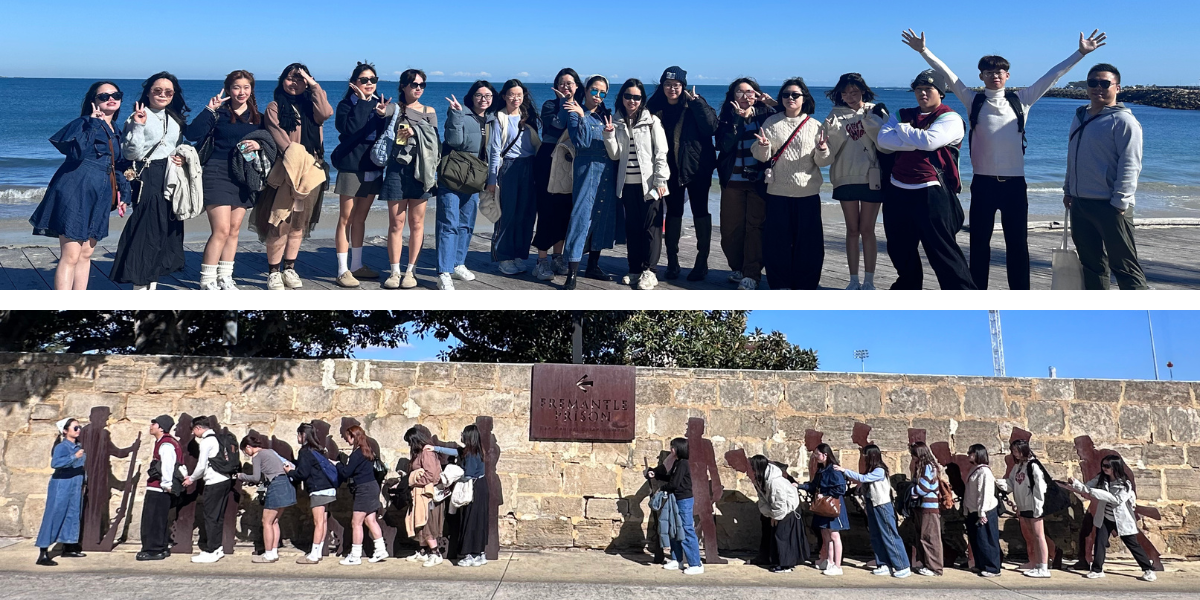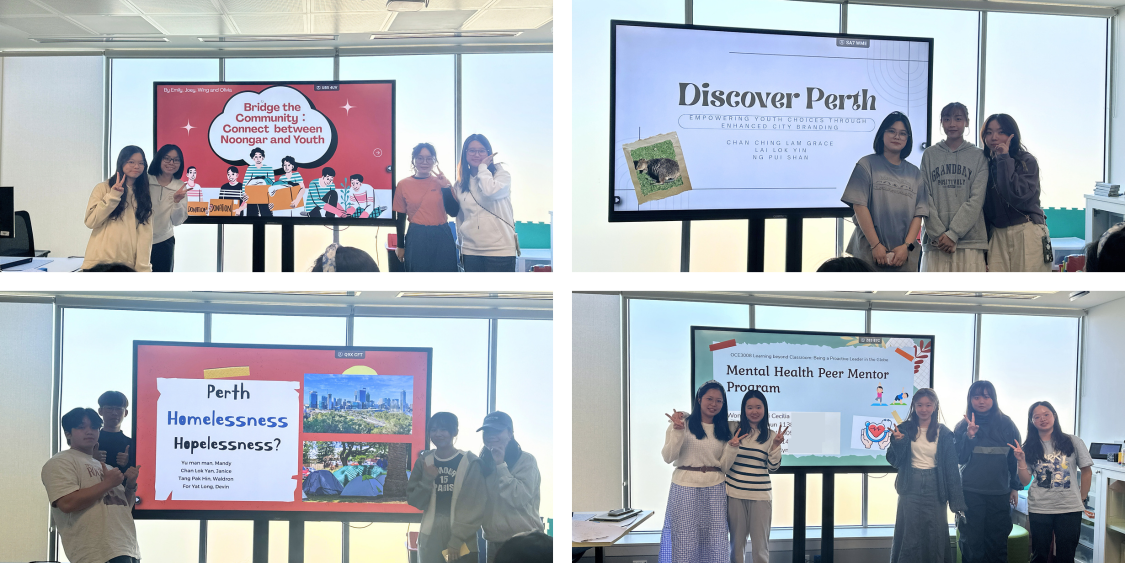From July 27 to August 8, 2025, a group of 18 students and teachers from our department embarked on an educational journey to Western Australia as the CLOC course “Learning beyond Classroom: Being a Proactive Leader in the Globe.” This study tour, organized in collaboration with Curtin University, was designed to foster students’ critical thinking and intercultural skills through immersive learning experiences both inside and outside the classroom. Most importantly, the programme provided students with the opportunity to practice their leadership skills and entrepreneurial spirit by engaging directly with the community and initiating ideas to address real social problems.
Academic Exchange at Curtin University: Building Foundations for Global Leadership
Upon arrival in Perth, our group was warmly welcomed by the staff of Curtin University. Over the next few days, students engaged in a series of academic exchanges and workshops with the School of Education. Professor Darren Bryant introduced students to the unique social, economic, and cultural characteristics of Perth and Western Australia, encouraging them to critically compare these aspects with those of Hong Kong. Through lively discussions, students gained a deeper understanding of local social challenges and opportunities.

Professor Darren Bryant provided workshop to our students
Dr. Luke Webster from the Curtin Outreach team delivered an inspiring session on the power of community engagement in education. He shared real-life examples of how small towns in Western Australia address social issues through collaboration between universities and the wider community. The Professional Experience Team from Curtin’s School of Education also introduced students to their teacher training and internship support mechanisms, inviting our students to brainstorm strategies for addressing challenges in teacher preparation.

Dr. Luke Webster was answering students’ questions

The Professional Experience Team shared their insights with our students
These interactive workshops not only broadened students’ academic horizons, but also sparked meaningful conversations about leadership, community involvement, and the future of education.

Field Visits and Cultural Exploration: Experiencing Community and Culture Firsthand
Stepping out of the classroom, students embarked on a series of field visits and cultural experiences that brought Western Australia’s rich heritage and dynamic community life to the forefront. In Fremantle, they reflected on the evolution of human rights and justice at the historic Fremantle Prison, while visits to Perth Zoo and Pinnacle Desert provided hands-on insights into environmental education and wildlife conservation efforts.

Students enjoyed the sharing session from the Education Team from Perth Zoo

Students joyfully posed at Pinnacle Desert
At Scitech, Western Australia’s leading STEM education NGO, students learned about the concept of “Science Capital” from Dr. Shaun New and saw firsthand how science engagement can empower communities. Also, a visit to Rottnest Island offered a unique perspective on balancing tourism development with environmental preservation, deepening students’ appreciation for sustainability.

Dr. Shaun New introduced Scitech to our students

Cute native quokkas on the Rottnest Island
Throughout the tour, conversations with local residents, Curtin University students, and museum staff encouraged students to reflect on indigenous cultures, social diversity, and the complexities of community life in Western Australia.


Leadership in Action: From Observation to Impact
The culmination of the study tour challenged students to transform their observations into action. Working in teams, they investigated pressing social issues, such as mental health, discrimination, city branding, and homelessness, presenting thoughtful analyses and proposing innovative solutions rooted in their experiences. This process was not only an exercise in critical thinking but also a demonstration of leadership and entrepreneurial spirit, as students translated their learning into actionable ideas for real-world challenges.
By drawing comparisons between Western Australia and Hong Kong, students honed their global perspectives and developed a deeper sense of responsibility as future leaders.

Conclusion
This two-week study tour was a transformative journey for all participants. Through academic exchange, field visits, and cultural immersion, students gained valuable insights into Western Australian society and developed critical global competencies. The experience not only broadened their perspectives, but also inspired them to think proactively about contributing to their own communities in Hong Kong.


We exchanged the gifts with Curtin University
Student Reflections:
Amy Kao: “This journey has also changed my understanding of creating sustainable social value. In the past, I thought the natural environment could be viewed as a usable resource or a risk to be avoided. However, standing in the desert and facing the natural landscape formed over hundreds of years, I realized that to create sustainable social value, we don’t have to utilize all resources. We must also understand the environment we live in and have the ability to see the big picture. We don’t need to think of ourselves as a leader, but we need to work side by side with those around us to effectively create sustainable social value.”
Queenie Chan: “Whether professionals were talking about science, technology, or zoo management, they consistently acknowledged or shared insights from Aboriginal knowledge and connection to the land. Talking to an international student revealed something powerful: everyone has to take a foundation course on Western Australia’s history and culture in order to help newcomers truly respect, understand, and embrace the local Indigenous heritage. ”
Grace Chan: “I believe Hong Kong could draw inspiration from Perth Zoo’s long-term educational model for young children. For instance, Hong Kong Ocean Park could develop a long-term program similar to “Bio Buddies,” designing extended nature exploration courses for young children centered on animal conservation. These could incorporate workshops, crafts, and observation logs to foster environmental awareness. Additionally, family engagement components, such as simple indoor or outdoor observation tasks, could encourage parents and children to document local wildlife together, enhancing learning continuity. ”
For more highlights and information about this tour, please follow our department’s Instagram.

Group Photo